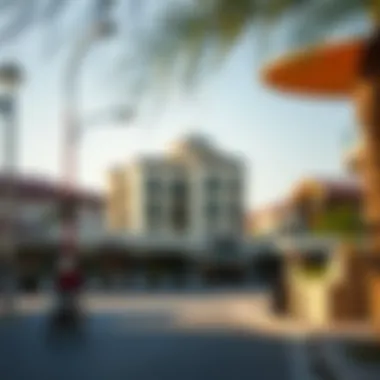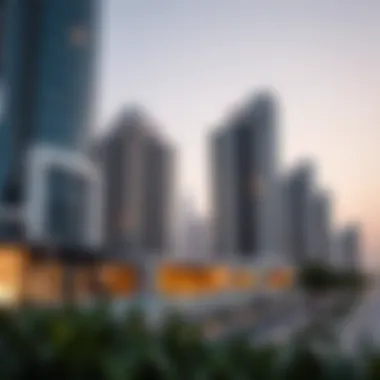Understanding Dubai's Real Estate Market Dynamics


Intro
Dubai's real estate market is not just a hotbed of luxury high-rises and sprawling villas; it represents a dynamic interplay of culture, finance, and opportunity. For homebuyers, renters, and investors, it’s essential to understand this landscape, as it constantly shifts and evolves. Understanding the nuances can make a world of difference in decisions regarding property ownership or investment.
This article serves as a detailed roadmap for anyone looking to navigate Dubai's real estate waters. With the city's strategic position as a global hub, the potential for growth and returns in real estate has attracted diverse demographics—from affluent expatriates seeking luxury living to savvy investors looking for the next big opportunity. Through this guide, we will delve into the myriad aspects that shape Dubai's property market, ensuring you have all the insights to make informed decisions.
Market Insights
Current Trends in Dubai Real Estate
The Dubai real estate market has seen significant changes over the past few years. A shift from purely luxury properties to a blend of mid-range options has emerged. Buyers and investors are increasingly considering properties that offer good value without compromising on quality. According to recent studies, the demand for apartments has surpassed that for villas, reflecting a changing lifestyle amidst the urban dynamics.
Adding to this trend is the city’s favorable regulations for foreign ownership, particularly in designated freehold areas. As a result, sectors like off-plan sales have become exceptionally popular, catering to both local and overseas buyers eager to enter the vibrant market before prices escalate further. In recent months, luxury villas are also seeing a surge in interest, fueled by the affluent buyer segment looking for spacious homes that provide privacy and high-end amenities.
Emerging Areas and Investment Hotspots
With innovative residential projects continually popping up, some neighborhoods have become noteworthy contenders for investors and homebuyers alike. Areas like Dubai Marina and Downtown Dubai remain firmly popular, but districts such as Dubai South and Jumeirah Village Circle (JVC) are garnering attention.
- Dubai South: Positioned as a key driver for the future economy, it is home to the Dubai World Central airport and the Expo 2020 site, promising solid returns on investment as infrastructure continues to evolve.
- Jumeirah Village Circle (JVC): Combining affordability with accessibility, JVC offers a variety of housing options and is rapidly developing, attracting a diverse community of residents.
With government initiatives aimed at enhancing investor confidence, benefitting from significant rentals and capital appreciation in these hotspots becomes increasingly plausible.
Buyer and Renter Guidance
Comprehensive Buying Process in Dubai
The process of purchasing property in Dubai can seem labyrinthine to the untrained eye. However, it can be streamlined effectively by following a structured approach.
- Research - Before anything, dive into the market. Familiarize yourself with different areas, property types, and pricing trends.
- Get Pre-Approved - Securing financing early can strengthen your bargaining position.
- Hire a Real Estate Agent - Engaging a knowledgeable agent can save time and stress. Ensure they are licensed and understand your needs.
- Visit Properties - Make sure you physically see options before committing. Images can say a thousand words, but nothing beats being there.
- Negotiation - Don’t shy away from negotiating the price.
- Transaction Regulations - Be aware of the additional fees such as service charges and registration costs that may arise.
- Finalize the Sale - Ensure all documentation is in order, and proceed with the transfer.
Essential Tips for Renters in Dubai
Renting in Dubai can be a comfortable experience if done correctly. Here are some tips that could enhance your renting journey:
- Understand Your Budget - Factor in additional expenses like utilities and maintenance.
- Know the Lease Terms - Understand what’s included in the lease and your rights as a tenant.
- Engage a Trusted Agent - Similar to buying, having a skilled agent can help. They can guide you to suitable areas that match both your needs and budget.
- Neighborhood Research - Determine if the locality suits your lifestyle. What amenities are nearby? Is public transport accessible?
By laying a solid foundation and understanding the market, you're not just throwing darts in the dark but rather, laying down a smart move in Dubai's top-tier property market.
Understanding the Dubai Real Estate Market
Understanding the Dubai real estate market is crucial for anyone looking to make property-related decisions in this vibrant city. For investors, expatriates, homebuyers, agents, and landlords, grasping the nuances of this market can mean the difference between a stroke of genius and a costly mistake. The dynamics of the market are influenced by a medley of factors including economic stability, local demand, and regulatory frameworks, all of which dictate how properties are valued and sold.
Market Overview
Dubai's real estate landscape stands out on a global scale due to its remarkable blend of luxury, innovation, and cultural diversity. The market has witnessed substantial growth over the past two decades, evolving from barren desert to a bustling metropolis. In 2023, the property sector continues on an upward trajectory, driven by a surge in demand from both local and foreign buyers.
- Property Value Trends: Prices in prime neighborhoods have skyrocketed, while more affordable areas are also gaining traction as families look for space and amenities.
- Market Resilience: The market has shown resilience through economic ups and downs, often bouncing back with vigor. Events like the Dubai Expo 2020 have provided temporary boosts, energizing investor interest.
This volatile yet exciting environment sets the stage for various investment opportunities. Buyers and investors should keep a watchful eye on market trends and be ready to act when the right moment arises.
Investment Climate
The investment climate in Dubai is characterized by a blend of high potential returns and inherent risks. The government has historically created policies to attract foreign investment, which has made the region a hotspot for real estate dealings. Here are several factors that contribute to the current investment climate:
- Tax Free Environment: With no property tax and minimal capital gains tax, the allure of Dubai becomes evident for many international investors.
- Regulatory Framework: The Real Estate Regulatory Agency (RERA) ensures a transparent property market, where developers and agents are held accountable, thus providing some level of security for investors.
Despite the favorable conditions, it’s essential to remain aware of global economic trends that can affect the climate. For instance, fluctuations in oil prices or geopolitical tensions can ripple through the market, impacting both demand and supply.
Key Stakeholders
A deeper look into the key stakeholders in Dubai's real estate market reveals a complex web of interaction that drives purchasing and selling decisions. Understanding who is involved can help prospective buyers and investors navigate their way through the landscape.
- Developers: Companies like Emaar and Damac play pivotal roles in shaping the market with their innovative projects.
- Real Estate Agents: Local agencies often have insider knowledge about the market, including emerging opportunities that may not be publicly listed yet.
- Government Entities: Various regulatory bodies work together to ensure the market operates smoothly, from zoning laws to property registrations.
- Investors: Both domestic and expatriate investors have their own goals, ranging from rental returns to long-term capital appreciation. Their decisions greatly influence market trends.
In summary, understanding these stakeholders helps buyers and investors to strategize effectively and maximize their interests.
"In the Dubai real estate market, the connection between stakeholders is not just transactional; it’s about building relationships that prosper over time."
Overall, grasping the subtleties of the Dubai real estate market is not just academic; it's essential for making informed financial decisions that can significantly impact your life.
Property Types in Dubai
Understanding the various property types in Dubai stands at the core of navigating the local real estate landscape. Whether you're an** expatriate** seeking a new home or an investor looking for profitable opportunities, knowing the different aspects of property choices can make all the difference. Each type of property not only offers unique benefits but also presents challenges and considerations that could impact your decision-making. By delving into the specifics of residential options, commercial spaces, and off-plan developments, one can better position themselves in this competitive market.
Residential Properties
Luxury Apartments
Luxury apartments in Dubai represent the pinnacle of modern living. These high-end dwellings typically boast prime locations and breathtaking views, making them much sought after by affluent buyers and renters alike. A key characteristic of luxury apartments is their state-of-the-art amenities, which might include infinity pools, saunas, and 24-hour concierge service. These features make the option incredibly appealing for both investment and personal use.
However, potential buyers should consider their high price tags, which might not align with every budget. Nonetheless, the potential for high rental yields and strong appreciation in property value remains a significant driver for many investor decisions. Furthermore, living in a luxury apartment offers a lifestyle that's hard to beat, particularly for those who enjoy vibrant city life.
Villas
Villas in Dubai cater to those seeking a more spacious and private living environment. Often designed with expansive lawns and private pools, they are a beloved choice for families. Villas typically offer more room for personalization and outdoor entertainment. Given their location in sought-after neighborhoods, they often retain their value well over time.
Yet, owning a villa can come with maintenance hassles and costs that one must consider. The property upkeep could be daunting for some, with landscaping and pool care often needing intensive attention. Still, many find the balance between comfort and luxury makes the investment worthwhile.
Townhouses
Townhouses offer a delightful blend of community living and private space. These properties are generally multi-story and provide ample square footage, which makes them a popular choice for young families or those looking for a mix of affordability and quality. A defining characteristic of townhouses is the community feel—often found in gated communities with shared amenities such as parks and swimming pools.
On the flip side, these homes might come with additional restrictions imposed by community regulations. Some buyers may feel limited by these guidelines. Nevertheless, for many, the sense of community and accessible lifestyle makes townhouses an inviting option in a vibrant city like Dubai.
Commercial Properties
Office Spaces
As businesses continue to flourish in Dubai, office spaces remain a hot commodity. The city’s status as an international business hub drives demand for prime office locations. These spaces not only represent opportunities for established firms but are also crucial for startups looking to make their mark. Generally characterized by modern building designs and location in business districts, office spaces tend to attract long-term leases as companies expand their footprint.
The downside can be the initial financial commitment, as quality office spaces often come with a hefty price tag. Companies hoping to rent might find prices in busy districts like Dubai Media City particularly high. Still, those willing to invest could find these properties yield fruitful returns.
Retail Units
Retail units in Dubai represent a vital part of the commercial landscape. With the city's increasing number of tourists and a thriving local population, these spaces are often at the heart of bustling neighborhoods. The characteristic of high foot traffic makes these properties a lucrative investment for those in the retail sector.
However, running a retail space requires a deep understanding of market trends and customer preferences. Investors must consider the evolving landscape of e-commerce, which can impact brick-and-mortar sales. Even with some risks, owning retail space in Dubai can harness the benefits of a steady influx of consumers.
Warehouses
In the context of e-commerce growth, warehouses have emerged as crucial assets. Located near transport hubs, such properties provide logistics solutions for businesses looking to streamline their supply lines. The characteristic of ample square footage tends to attract both investors and enterprises, as storage becomes increasingly critical.
However, potential pitfalls may involve zoning laws and proximity to residential areas, which can limit development options. Regardless, savvy investors keeping an eye on market trends can leverage growing demand in this sector.
Off-Plan Developments
Investing in off-plan developments offers potential rewards for those willing to navigate the uncertainties associated with future constructions. These projects frequently come at a lower price point, making them an attractive option for first-time buyers and investors alike. Off-plan properties often promise high returns on investment due to anticipated value increases by the time of completion.
Yet, taking a chance on off-plan developments necessitates thorough due diligence. It's crucial to assess the credibility of the developer and their track record before diving in. Therefore, proper research and a bit of patience can yield remarkably fruitful results in Dubai's dynamic real estate market.
Neighborhood Analysis
Understanding the array of neighborhoods within Dubai is paramount for anyone operating in the real estate sector. Each locale boasts distinct characteristics that can significantly influence property value, living experience, and investment potential. When buyers, renters, or investors take the time to find out what each neighborhood offers, they position themselves to make informed decisions that suit their needs.
From the bustling city center to quieter suburban areas, the neighborhoods vary widely in amenities, culture, and overall vibe. Market trends, property prices, and demographic shifts can all play a role in the desirability of a neighborhood, impacting long-term investments and lifestyle choices.
Real estate investors in Dubai need to consider factors such as proximity to essential services, public transport options, and proximity to other attractions. From entertainment districts to tranquil spaces for families, the analysis of neighborhoods can lead buyers to properties that not only meet their immediate needs but also align with their future aspirations.
"A good neighborhood can elevate your property’s value, but a poor choice can leave investors holding the bag."


Downtown Dubai
Downtown Dubai is often seen as the heart of the city. Home to the iconic Burj Khalifa and the impressive Dubai Mall, it is a major draw for both tourists and residents alike. Living in this area signifies a lifestyle drenched in luxury and convenience. Residents enjoy easy access to high-end retail shops, gourmet dining, and vibrant entertainment options.
However, this glitz comes at a price. Properties here tend to be on the higher end of the spectrum. The area attracts a wealthier clientele, making it a prime target for real estate investors looking for luxury apartments and hotel-style living options. Additionally, the ongoing developments in Downtown Dubai continue to increase property values, affirming its status as a lucrative investment option.
Dubai Marina
Dubai Marina is a sought-after waterfront neighborhood that perfectly encapsulates the city’s modern allure. Characterized by high-rise towers and luxurious residential complexes, it offers a lifestyle marked by stunning views and a lively atmosphere. The Marina Walk, with its host of cafes and shops, creates a pedestrian-friendly environment that appeals to both local residents and expatriates.
Renting or buying property in Dubai Marina presents diverse options from cozy studios to lavish penthouses. While this area can be busy with high turnover rates, it remains a solid choice for buyers and investors looking to capitalize on the rental market. The proximity to the beach and vibrant nightlife adds to the neighborhood's charm, making it a hotspot for younger individuals and families alike.
Jumeirah
Jumeirah represents a luxurious and upscale neighborhood known for its stunning villas and proximity to some of the best beaches in Dubai. This area is particularly popular among expatriates and affluent families seeking spacious living conditions combined with high-quality amenities.
The architectural style of Jumeirah ranges from traditional Arabian designs to contemporary masterpieces. Not only does it offer a variety of luxury properties, but it also features schools, hospitals, and shopping centers that cater to family needs. The tranquil atmosphere combined with a strong community feel makes Jumeirah an attractive option for both living and investing.
Just as importantly, Jumeirah is conveniently located near key areas of Dubai, allowing for easy commuting to business districts and leisure spots, which enhances its desirability in the housing market.
Arabian Ranches
Arabian Ranches offers a serene retreat from the urban hustle and bustle, blending suburban living with luxury. It is primarily a villa community, providing a family-friendly environment complete with parks, schools, and shopping centers. The architectural designs are inspired by Spanish, Mediterranean, and Arabian styles, which enhance the charm of the neighborhood.
Considering family needs, this area provides spacious homes and extensive amenities such as golf courses and horseback riding. It's an attractive location for those looking for a quieter lifestyle without sacrificing accessibility to urban facilities. Investing in Arabian Ranches is often viewed as a prudent choice because of its established community and continued demand for family-oriented properties.
The neighborhood's ongoing developments only solidify its position as a desirable location in Dubai’s complex real estate landscape.
Financial Considerations
Understanding the financial aspects of real estate in Dubai is not just a necessity; it’s the backbone for anyone stepping into this vibrant market. With property prices soaring and various investment options popping up, grasping the intricacies of your financial responsibilities and opportunities is key. This section will unpack the various elements of property prices, financing options, taxes, and fees that every buyer, investor, or renter must contemplate. Having a handle on these factors can mean the difference between a sound investment and a costly mistake.
Understanding Property Prices
Property prices in Dubai fluctuate based on several factors, including location, property type, and market demand. For instance, the allure of Downtown Dubai comes with a heftier price tag compared to more suburban areas like Dubai South. Demand for luxury apartments tends to drive prices up, while fluctuations in the expat population can influence overall housing availability. It's essential to keep tabs on trends and forecasts. Getting familiar with the market helps buyers determine if it's a buyer's market or a seller's market, essentially whether prices might dip or climb.
Financing Options
Mortgages
When it comes to purchasing a property, most buyers strategically opt for a mortgage. These loans allow buyers to leverage their finances; essentially, you pay a percentage upfront and cover the rest over time. In Dubai, mortgages typically require a down payment of 20-25% of the property’s value, with the rest financed through the bank. A notable characteristic of mortgages is their flexibility. Given the competitive landscape, many lenders offer tailored products that fit various buyer profiles.
However, it’s crucial to weigh the long-term financial implications. Monthly payments and interest rates can add up significantly over years, especially with fluctuating interest rates.
Cash Purchases
Some investors choose cash purchases for the simplicity they offer. This option means paying the full price upfront, eliminating the need for loans and monthly payments. It’s a popular choice among seasoned investors, particularly those wanting to avoid interest payments or potential market fluctuations.
Yet, while it has advantages like negotiating power, cash buyers need to prepare for the potential downside of liquidity constraints. Tying up cash in real estate can feel secure but limits the investor's ability to diversify their portfolio.
Investment Loans
Investment loans are specifically designed for real estate purchases aimed at generating rental income or capital appreciation. They often come with favorable loan-to-value ratios. Investors can leverage this type of loan as a tool for expanding their portfolios. Unlike traditional mortgages, these loans may come with higher interest rates and tighter requirements. Investors should carefully assess cash flow projections to ensure they can cover the expenses without overstretching their finances.
Taxes and Fees
Navigating the landscape of taxes and fees can feel daunting, but being informed can help budget purchasing power.
Registration Fees
Every buyer needs to consider registration fees when purchasing property in Dubai. This cost is usually around 4% of the property purchase price and can be seen as a nominal cost when compared to local real estate markets. Registration serves the essential function of securing your ownership formally and establishing your rights.
Service Charges
Service charges apply to properties in residential or commercial buildings for upkeep and common area maintenance. It’s essential for investors or buyers to inquire about these fees before purchasing. They typically cover everyday maintenance and management of shared facilities. The specific structure of service charges can vary significantly depending on the property, making it vital to understand what those charges encompass.
Maintenance Costs
Property maintenance is an ongoing responsibility that all owners encounter, and it’s essential to factor these expenses into your budget. Whether it be regular upkeep or unexpected repairs, maintenance costs can quickly add up. Having a spare fund set aside for emergencies can provide a safety net, ensuring that even the unexpected doesn’t derail your financial plans.
Overall, approaching financial considerations with a well-rounded perspective not only equips prospective buyers with the knowledge they need but also helps foster informed decision-making. Understanding market dynamics and financial structures will not only empower buyers but pave the way for successful real estate ventures in this vibrant city.
Legal Framework
Understanding the legal framework surrounding real estate in Dubai is crucial for anyone looking to invest, buy, or rent property in this dynamic city. Given the rapid growth of the market and the diverse range of property options, familiarity with the legal intricacies can make or break a deal. Here, we delve into the essential laws and regulations that govern property ownership, contracts, and dispute resolution in Dubai’s real estate landscape.
Property Ownership Laws
In Dubai, property laws tend to cater specifically to local and foreign investors alike. The Property Ownership Law of 2002 was a watershed moment; it allowed non-UAE nationals to own property in designated areas. This change broadened the market dramatically, inviting global investors to stake their claim in a city known for its glitz and glamour.
It’s important to note that ownership is typically classified under freehold and leasehold. Freehold property grants complete ownership rights, whereas leasehold property, often lasting up to 99 years, permits ownership of the land building only. Familiarity with these distinctions can help foreign investors navigate their options more effectively.
Contracts and Agreements
When it comes to buying or renting property in Dubai, contracts and agreements hold immense significance. The law requires that all real estate transactions be documented in a contract format, often referred to as the Memorandum of Understanding (MOU). This document outlines the terms agreed upon by the buyer and seller, covering aspects like price, payment schedules, and completion dates.
Getting the contract right is paramount—having a solid legal footing protects parties from potential disputes. Moreover, utilizing the services of a legal expert can bolster understanding of finer details, such as any additional clauses or conditions that may not be immediately apparent.
"A well-crafted agreement is like a good pair of shoes; it can carry you far without discomfort."
Dispute Resolution
Disputes can arise surprisingly easily in real estate transactions. Local laws specify the mechanisms available for resolving such issues. The Dubai Land Department (DLD) provides a platform for mediation to resolve conflicts related to properties. In the event that disputes escalate, parties may also resort to arbitration, which is often faster and less expensive than conventional court proceedings.
Being aware of these dispute resolution pathways is vital for any investor or buyer. Not only does it ensure peace of mind, but it also equips individuals with the knowledge to act promptly should conflicts arise. It’s wise to have the contact information for a reputable mediator or legal advisor handy before committing to any significant real estate investment.
In summary, navigating the legal framework surrounding Dubai's real estate involves understanding property ownership laws, mastering contracts, and knowing how to resolve potential disputes. For anyone entering this bustling market, investing time in comprehending these factors can pave the way for smoother transactions and hopefully profitable outcomes.
Navigating the Buying Process
In the complex Dubai real estate scene, understanding how to navigate the buying process is not just beneficial but essential for anyone looking to purchase property. This journey is layered with distinct steps and considerations that can significantly impact the overall experience. From identifying the right property to making an effective offer, each phase requires a nuanced approach.
A well-planned buying process simplifies what can typically feel like a tangled web of regulations and options. Knowing what you need, how to efficiently view properties, and how to present an appealing offer can act as a guiding light through the maze.
Identifying Needs and Preferences
Every buyer begins their journey with a set of needs and preferences that guide their choices. It’s crucial to spend time clarifying what you are looking for, be it location, size, type, or budget. Getting specific about these aspects can steer you away from wasting time on properties that don't fit the bill.
When mapping out your preferences, consider questions like:
- What type of property fits your lifestyle? An apartment in Downtown Dubai might appeal to some, while others may lean towards a villa in Arabian Ranches.
- What's your budget? Be realistic about what you can afford, not just for the down payment but the ongoing costs as well.
- What amenities are must-haves? Proximity to schools, parks, or shopping areas can weigh heavily on your choice.
By creating a checklist of your needs, you can better communicate your vision to real estate agents, making the process much smoother and focused.
Conducting Property Viewings
Once you've identified your preferences, it’s time to roll up your sleeves and start visiting properties. This is the phase where the rubber meets the road. Conducting property viewings isn't merely about checking off boxes; it's about feeling the property's vibe and assessing if it truly aligns with what you're after.
Tips to keep in mind during viewings:
- Take your time. Don’t rush through a property. Schedule adequate time to walk through each room, check for necessary details, and truly visualize living there.
- Bring a list of questions. Inquire about the property’s history, maintenance issues, and the neighborhood.
- Tip the scale in your favor. If you're seriously considering a few options, don’t hesitate to request a second viewing. This can help solidify your impressions or highlight concerns you might have missed the first time.
Lastly, remember that a property might look good on paper but often, it’s in the details where the real story lies. Each viewing gives you distinct insights that can play a pivotal role in your decision-making.
Making an Offer
When you find the perfect property, it’s time to pull the trigger and make an offer. Crafting an effective offer isn’t just about the number; it must take into account multiple factors. Issues such as current market conditions and the seller’s motivations can influence the outcome significantly.
Here’s a process to consider:
- Research comparable property prices. Know what similar properties are selling for in the area to make an informed decision.
- Communicate openly. If your offer is below asking price, be prepared to explain why. Justify your offer with facts to reassure the seller you are a serious buyer.
- Be flexible. If the seller counters your offer, evaluate what changes can be made that keep you comfortable while still being appealing to the seller. This could involve adjusting your offer price or being flexible with the timeline.


"Remember that buying real estate isn’t just about financial investments; it’s about building a future. Take your time, be thorough, and don’t rush into decisions that might not align with your expectations."
Navigating the buying process in Dubai can be daunting, yet with careful planning and consideration, it can also be immensely rewarding. By focusing on your needs, viewing properties thoughtfully, and making informed offers, you set the stage for success in this vibrant property landscape.
Renting in Dubai
Renting in Dubai has become an essential option for many people due to the city’s rapid growth, diverse living arrangements, and the blend of cultures representing its residents. This section delves into various facets that make renting appealing, key considerations, and the benefits it offers to potential tenants. Given the dynamic nature of Dubai's real estate market, understanding renting can significantly influence both choice and satisfaction when finding a home.
Rental Market Trends
The rental market in Dubai has seen remarkable changes in recent years. As of late, there has been a noticeable shift towards more affordable options for expatriates and locals alike, driven largely by increased supply and changes in demographic demand. More buildings are cropping up in neighborhoods that were previously quieter, such as Dubai Sports City and Silicon Oasis.
Current Trends Include:
- Increased Inventory: Several new developments are coming to the market annually, creating a heightened battle for tenants, which ultimately translates to better deals.
- Short-Term Rentals: Platforms like Airbnb have exploded, increasing competition in the traditional rental market, as landlords look to maximize their income.
- Stabilization of Prices: Following a period of rapid growth, rental prices have leveled out in many neighborhoods, providing more value for money compared to annual rates seen in previous years.
"In Dubai, you can expect to find a blend of the modern and the traditional, from high-rise towers in Dubai Marina to cozy villas in Arabian Ranches."
Lease Agreements
Understanding lease agreements is crucial, as this is where the foundation of a tenant's relationship with the landlord is formed. A typical lease in Dubai runs for a minimum of 12 months, but it’s vital to know the specifics before making commitments. Here are some key aspects:
- Standard Lease Duration: Most leases are renewable annually, offering flexibility to both parties after the initial term.
- Security Deposits: It’s common for landlords to ask for a security deposit equal to five percent of the annual rent, returned at the end of the lease if all’s well.
- Rent Increases: Be aware of the Rent Law applicable in Dubai which can regulate how much rent can be increased at the end of a tenancy.
Informing oneself about all the clauses, including maintenance obligations and notice periods for termination, can prevent stress down the line.
Tenant Rights and Responsibilities
Tenants in Dubai enjoy certain rights and duties that are essential for maintaining a harmonious living environment. Understanding these can empower renters. Some critical points include:
- Right to a Habitable Space: Tenants deserve a safe and well-maintained property, as landlords are legally obliged to carry out necessary repairs.
- Privacy Rights: Tenants should be given reasonable notice prior to landlord visits — typically 24 hours.
- Responsibility for Payments: Timely payment of rent and utility bills is a must, as failure to comply can lead to eviction proceedings.
- Communication Transparency: Both parties should maintain a clear channel of communication to address issues such as maintenance and disputes promptly.
Being informed about these responsibilities fosters a respectful relationship between tenants and landlords.
This section has identified the landscape of renting in Dubai, highlighted the trends that are currently shaping the market, addressed the importance of understanding lease agreements, and underscored tenant rights and responsibilities. All of these elements combined create a strong foundation for both current and prospective renters in Dubai.
Investment Opportunities
Investment opportunities in Dubai's real estate market present a chance for prospective buyers and investors to tap into a landscape known for its luxury and potential for high returns. This is especially relevant amidst the city�’s rapidly evolving market, influenced by various factors including tourism, economic stability, and increasing expatriate populations. The unique layout of property types and the diverse demographic here create distinct opportunities worth considering.
Emerging Hotspots
Diving into emerging hotspots can signal where future growth lies.
- Dubai South: This area, centered around the Expo 2020 site, is picking up steam. The development of logistics and residential sectors offers investors a sweet spot, likely seeing property values escalate as infrastructure improves.
- Dubai Creek Harbour: Set against the backdrop of the creek, this project promises a blend of residential, commercial, and hospitality options. Its vision includes a new iconic tower that’s expected to attract not just local but international buyers.
- Jumeirah Village Circle (JVC): With family-friendly amenities, JVC is becoming a hot favorite for those seeking affordable housing options. The expected expansions will certainly boost interest in the area, making it one to watch.
These spots represent a slice of where Dubai is heading. It’s about understanding that some neighborhoods evolve much quicker than others.
Luxury Real Estate Investment
Investing in luxury real estate in Dubai remains a cornerstone for those looking to solidify their asset portfolios. High-end properties beckon not only for their grandeur but for their potential to appreciate over time.
- High Demand: The appetite for luxury properties shows no signs of slowing down, primarily driven by wealthy expatriates who view Dubai as a safe and attractive haven. Buyers seek options from palatial villas in Emirates Hills to upscale apartments in Downtown.
- Rental Yields: Achieving substantial rental returns remains attractive due to the constant influx of clientele. Investors in these properties often enjoy impressive yields compared to other global cities.
An investment in this market segment requires a keen eye for luxury amenities and location, as these factors directly influence both rental rates and resale values.
Commercial Real Estate Trends
The commercial real estate segment in Dubai is not to be underestimated. With the city becoming a hub for multinational corporations, office spaces, and retail establishments are thriving.
- Business Hubs: Areas like Dubai International Financial Centre (DIFC) and Business Bay continue to attract investors owing to their strategic locations and modern facilities.
- Retail and E-commerce: The shift towards e-commerce has modified retail spaces significantly. Malls are rethinking their layouts to accommodate experiential retail, which draws more visitors.
- Flexible Workspaces: Trends show an uptick in demand for co-working spaces, appealing to start-ups and freelancers.
In summary, understanding these facets of commercial real estate helps investors locate value, benefiting from not just current market trends but future forecasts as well.
Investing in Dubai's real estate is not just about bricks and mortar; it's about aligning with the pulse of a vibrant economy.
As the city continues to evolve, staying updated on these investment opportunities is crucial for both seasoned and new investors alike. Knowledge is often the key to unlocking significant returns.
Architectural Highlights
When discussing the Dubai real estate landscape, architectural highlights hold a significant place. They serve as the backbone for attracting not just tourists but also investors and homebuyers keen on understanding the locale's character. Dubai is renowned for its skyline that showcases a breathtaking array of designs, which not only reflect luxury but also cultural narratives.
Understanding these highlights gives prospective buyers and investors insight into what makes a property or a neighborhood desirable. Iconic developments like the Burj Khalifa are not simply tall buildings; they are symbols that resonate with aspiration and innovation. The architecture prevalent in Dubai also frequently integrates modern technology, emphasizing smart living while remaining aesthetically pleasing.
This aspect of architecture is crucial for investors who recognize that unique and high-quality designs can significantly uplift property values. Buyers often search for homes and investments that do more than just meet their needs; they want properties that tell a story and represent a lifestyle. The architectural persona of a community plays a pivotal role in this narrative.
Iconic Developments
Among many iconic developments in Dubai, the Burj Al Arab stands out, often called the world's only seven-star hotel. Its distinctive sail-like silhouette is more than a visual delight; it epitomizes luxury and excellence, making each visit a memorable one. Subsequently, the design has reshaped perceptions of opulence, making it an illustrious point of interest for those looking to invest in high-end real estate.
Another remarkable structure, the Dubai Mall, seamlessly combines commercial space with breathtaking architectural feats. Its sheer size is staggering, offering an unparalleled shopping and entertainment experience. The mall incorporates elements like an indoor waterfall and an ice rink, showcasing not only architectural daring but also a visionary approach to urban living.
- Essence of Design in Iconic Developments:
- They elevate the city’s profile as a global destination.
- They set benchmarks for future projects.
- They attract high-profile tenants and buyers looking for prestige.
Sustainable Architecture
In recent years, sustainability has taken a front seat in Dubai's architectural dialogue. Developers are increasingly embracing sustainable architecture due to growing global concern for environmental issues and the promise of lower operational costs.
Properties like The Sustainable City are brilliant examples of this shift. This community integrates energy-efficient designs and alternative energy sources, demonstrating that luxury can indeed coexist with eco-friendliness. Residents enjoy solar power, green spaces, and vehicle-free zones, making living more pleasurable and sustainable.
The emphasis on sustainability not only appeals to environmentally-conscious buyers but also meets the evolving regulatory standards. Consequently, properties designed with sustainability in mind are likely to yield higher long-term value and attract a diverse demographic.
Future Trends in Design
Looking ahead, the future of architectural design in Dubai seems promising. Advancements in technology and design thinking are driving innovation. Concepts such as biophilic design are on the rise—bringing nature indoors to create healthier living environments.
Additionally, smart buildings equipped with automation for energy management and security are becoming standard. Investors might keep an eye on developments incorporating artificial intelligence and augmented reality to enhance user experience and interaction. The Dubai Creek Tower, upon completion, is expected to blend cutting-edge technology with unique design features, setting new trends in high-rise construction.
- Possible Future Trends:
- Increased use of modular construction techniques.
- Focus on multifunctional spaces that adapt to user needs.
- Incorporation of local cultural elements into modern design.
As the market evolves, understanding these architectural highlights, from iconic landmarks to emerging sustainable solutions, is key for potential investors and homebuyers seeking to navigate this dynamic real estate landscape.
Cultural Influences on Real Estate
Cultural influences play a significant role in shaping the dynamics of real estate in Dubai. This vibrant city is a melting pot of cultures, with expatriates from every corner of the globe contributing to the unique social fabric. Understanding how culture impacts property choices, trends, and the overall real estate landscape can provide invaluable insights for investors, homebuyers, and renters alike.
Diversity in Property Offerings
The diversity in property offerings in Dubai is not merely a matter of architectural aesthetics; it reflects the city’s cultural richness. With a wide array of properties encompassing everything from opulent skyscrapers to quaint townhouses, each type caters to different cultural tastes and lifestyles.
- Luxury Apartments: These often attract affluent expatriates and locals alike, offering high-end amenities that resonate well with the expectations and desires of a diverse clientele.
- Villas and Townhouses: These properties appeal to families seeking a more suburban lifestyle, often influenced by cultural preferences for communal living and larger family spaces.
The sheer variety ensures that potential buyers or renters can find something that speaks to their personal tastes and preferences. This is further supported by ongoing developments in areas like Dubai Hills Estate and Jumeirah, which continue to expand the palette of options available.
Impact of Expat Communities
Expat communities have a profound influence on the real estate landscape in Dubai. As they settle in, their unique cultures and lifestyle choices shape the demand for specific property types and neighborhoods. These communities often cluster in areas that resonate with their backgrounds, resulting in neighborhoods that echo their heritage, preferences, and needs.
"Dubai's ever-evolving real estate market is as much a reflection of its residents' lifestyles as it is of economic trends."
- Community Preferences: Many expatriates prefer properties close to schools, international amenities, and cultural hubs. Areas like Dubai Marina and Jumeirah have become popular due to their proximity to leisure activities and community facilities.
- Investment Behavior: The presence of a strong expat community often leads to increased demand in rental markets, as these individuals seek flexible options that cater to their transient lifestyles. This trend not only drives property prices up but also influences property developers to create more inclusive and diverse offerings.
Emerging Technologies
The infusion of emerging technologies into the real estate sector has dramatically shifted how transactions are conducted, viewed, and valued in Dubai's dynamic market. As potential buyers, renters, and investors navigate their choices, understanding these advancements becomes critical. Technologies like digital platforms and virtual reality tools not only enhance the consumer experience but also streamline processes that once seemed cumbersome.
By incorporating such innovations, stakeholders can glean insights that were previously unattainable, making informed decisions that align with their financial aspirations and lifestyle needs.


Digital Platforms for Property Listings
In recent years, digital platforms for property listings have emerged as game-changers. Gone are the days when scouring newspapers or relying solely on real estate agents defined the search process. Today, websites like Property Finder, Dubizzle, and Bayut offer a plethora of listings, each with intricate details such as price points, square footage, and captivating images.
In addition, these platforms provide updates in real-time. Users can easily filter their search, perfect for those wanting specific amenities or those keen on particular neighborhoods like Dubai Marina or Jumeirah. Notably, many platforms also employ algorithms that suggest properties based on user preferences, making the entire experience more personalized.
Benefits of Digital Platforms:
- Access to a wide range of properties
- Easy comparison of attributes
- Up-to-date market pricing
- Connectivity with sellers or agents directly
- User-friendly interfaces that cater to diverse demographic needs
"Understanding the digital landscape is no longer optional, but essential for making informed decisions in today's fast-paced market."
Virtual Tours and Augmented Reality
The advent of virtual tours and augmented reality (AR) has further transformed how properties are showcased. With these tools, potential buyers can step into homes without leaving their current locations. Imagine lounging on your couch while exploring a luxurious villa in Dubai Hills or checking out a sleek apartment in Downtown Dubai—this is now your reality.
Virtual tours often aim to mimic a physical viewing experience, empowering buyers with greater flexibility. Moreover, AR enhances this by overlaying potential renovations or furnishing arrangements directly onto a live view of the space, helping individuals visualize their future living environments.
This technology not only saves time but also improves decision-making by allowing prospective buyers to rule out or consider properties far more efficiently.
Key Considerations:
- Enables thorough exploration without geographical constraints
- Offers interactive experiences that traditional images cannot
- Assists in showcasing the potential of a property, beyond just the current state
As technology continues to evolve, being proficient in its utilization can make a significant difference in navigating Dubai's complex real estate landscape.
Interacting with Real Estate Agents
Navigating the intricacies of Dubai's real estate market can feel like a daunting task, especially for newcomers. This is where the role of real estate agents becomes pivotal. These professionals not only streamline the buying or renting process but also provide invaluable insights that can save both time and money. Understanding how to interact effectively with an agent can significantly enhance the overall experience, making it essential for any prospective buyer, renter, or investor.
Choosing an Agent
When considering entering the property arena in Dubai, the first step is choosing the right agent. A good agent can make all the difference, transforming a potentially overwhelming experience into a smooth journey. Here are some factors to contemplate:
- Local Expertise: Ideally, you want to work with an agent who is deeply familiar with the local market, including neighborhood trends, property values, and cultural nuances. An agent with a solid track record in Dubai will be well-versed in the intricacies of various districts, from the bustling Downtown to the serene Arabian Ranches.
- Reputation and Reviews: Take a moment to research potential agents. Online reviews and testimonials go a long way in revealing their approach and effectiveness. Hearing about other clients’ experiences can help you make a more informed decision. Websites like Reddit or Facebook groups focused on Dubai real estate could provide real insights.
- Communication Style: Establishing a rapport is key. An agent should be responsive and adaptable to your communication preferences. Whether you prefer text messages, emails, or phone calls, they should accommodate your needs without a hitch.
- Transparency: A trustworthy agent is upfront about fees, commissions, and any potential conflicts of interest. Don’t shy away from asking tough questions—this is your investment, after all.
Agent Success Factors
The right agent doesn’t just help in sealing the deal; they possess qualities and skills that contribute significantly to their success. Here are some factors that set apart an exceptional real estate agent in Dubai:
- Negotiation Skills: This is a deal-breaker, quite literally. A seasoned agent knows how to advocate for your interests, ensuring you get the best possible price, whether you’re buying or renting. They have their finger on the pulse of market conditions and can craft strategic offers.
- Networking and Connections: Well-connected agents can provide leads on upcoming properties that may not yet be on the general market, granting you an edge in your search. Their relationships with developers and other industry insiders can be beneficial.
- Continual Learning: The real estate landscape is always evolving. Agents who invest time in continuing education through certifications or workshops stay updated on trends, laws, and local regulations. This not only enhances their credibility but also ensures they deliver valuable advice
- Client-Centric Focus: Agents who tailor their services around client needs often enjoy lasting success. Putting clients first demonstrates commitment and fosters long-term relationships. A good agent checks in even after the deal closes, as referrals from satisfied clients can be a significant source of future business.
Interacting with real estate agents effectively is essential. When you choose wisely and understand the traits that contribute to their success, you set yourself up for a more rewarding experience in Dubai's vibrant real estate market.
"A good agent will not just sell property, they will invest their time to understand your unique needs and objectives."
For more insights about Dubai real estate dynamics, you can check resources like Britannica for an overview of the market background.
The Role of Government Regulations
Understanding the intricacies of government regulations is pivotal for anyone exploring the Dubai real estate market. Regulations provide a framework that governs how real estate transactions occur, ensuring transparency and fairness for buyers and sellers alike. They play a crucial role in shaping the investment landscape and can significantly influence decisions made by both local and foreign investors.
When acquiring property in Dubai, government regulations serve as a foundation that establishes the rights and obligations of all parties. This guarantees that investors are protected and helps mitigate risks associated with property transactions. Understanding these regulations is akin to having a roadmap; without it, one may find themselves lost in a complicated and unfamiliar terrain.
Additionally, adhering to these regulations helps in maintaining a stable market environment, which is beneficial for long-term investments. As the landscape evolves continuously, familiarity with the legal framework allows investors and homeowners to navigate potential pitfalls effectively. In essence, staying informed about current regulations can mean the difference between a smooth transaction and expensive legal troubles.
"In a market as dynamic as Dubai's, regulations are not merely guidelines; they are essential instruments for sustainable growth."
Regulatory Bodies
In Dubai, several regulatory bodies oversee the real estate market, ensuring that laws are enforced and that both buyers and sellers comply with local regulations. The most prominent among these is the Dubai Land Department (DLD), which is the primary authority responsible for registering property transactions and issuing title deeds. The DLD plays a significant role in promoting transparency in dealings and safeguarding the interests of investors.
Another key player is the Real Estate Regulatory Agency (RERA), an essential part of DLD that specifically focuses on regulating the real estate sector. RERA handles matters such as licensing real estate professionals, ensuring compliance with property laws, and mediating disputes between landlords and tenants. Their role enhances consumer protection measures and fosters a responsible real estate market.
Other important bodies include the Dubai Multi-Commodities Centre (DMCC) and the Dubai Free Zones, which create tailored regulations for foreign investors looking to establish a presence in Dubai. These zones often offer attractive incentives and streamlined processes to encourage investment, thus facilitating ease for foreign investors.
With all these agencies in place, it's clear that there is a structured governance model to guide the real estate landscape.
Policies Affecting Foreign Buyers
The government of Dubai has crafted specific policies to cater to foreign investors, recognizing that they bring valuable capital and expertise into the local market. These policies can substantially shape the purchasing power of expatriates, making it essential for buyers to understand them thoroughly.
Foreign investors can typically own property in designated areas, often referred to as freehold areas. This ownership grants them full title to the property, along with the rights to lease or resell it. Notably, investing in these areas offers significant benefits, such as obtaining residency visas, which enable foreign nationals to live and work in the UAE.
Moreover, the government often implements attractive financing schemes that facilitate property purchases for foreign investors. For instance, banks may offer favorable mortgage rates or down payment plans tailored to expatriates. This can ease the financial burden and make property acquisition more accessible.
However, foreign buyers must also be mindful of certain restrictions, including limits on ownership percentages in certain developments and additional administrative fees. For instance, there are common charges like the property transaction fee of 4% of the sale price payable to DLD. This underscores the importance of conducting thorough due diligence.
While buying property in Dubai can be an appealing venture for foreigners, understanding these policies is crucial for navigating the landscape effectively. A clear grasp of the rules can help avoid misunderstandings and potential snags during the purchasing process.
Post-Purchase Considerations
The journey of acquiring property in Dubai isn't just about closing the deal and getting the keys. After the purchase, a new set of responsibilities and considerations come into play that can significantly affect an investor's or homeowner's experience. Understanding how to manage your property, strategizing for future resale, and grasping the nuances of market shifts are key elements that all buyers must navigate intelligently.
Property Management
Property management in Dubai represents an essential component of maintaining value in your investment. With a vibrant market and a diverse population, effective property management can make the difference between profit and loss. Here are some factors to consider:
- Tenant Relations: Good communication is vital. Engaging positively with tenants not only promotes occupancy rates but can also reduce turnover, saving an owner time and expense.
- Maintenance: Regular upkeep is crucial in a city where the climate can take a toll on buildings. Having a management service can help coordinate repairs quickly and efficiently, maintaining the property's appeal.
- Financial Tracking: Keeping detailed records of expenses and income is key. This can make tax time less of a headache and help in assessing the property’s performance accurately.
Developing a solid relationship with a management company, if you choose to hire one, can yield benefits, especially if you are not residing in Dubai full-time.
Resale Strategies
When heading towards the resale market, a seller's approach can dramatically impact potential returns. A thoughtful strategy can provide a considerable advantage, offering benefits like:
- Market Timing: Understanding when to sell is crucial. Monitoring market cycles and growth patterns is essential to time your sale properly. Selling during a peak can significantly increase your profits.
- Property Improvement: Making small improvements can also yield great returns. Something as simple as a fresh coat of paint may enhance property appeal.
- Effective Marketing: Using quality photographs and creating engaging listings can boost interest. Today’s buyers often start their journey online, so your property needs to stand out.
Be sure to stay informed about neighborhood dynamics and the competitive landscape; these aspects can guide pricing or promotional strategies.
Understanding Market Cycles
Finally, grasping the complexities of market cycles is vital for anyone involved in the Dubai real estate scene. The property market ebbs and flows, influenced by various local and global factors. To navigate effectively, consider:
- Seasonal Trends: Certain times of the year may show distinct patterns in buyer behavior. Understanding these may help in planning buy/sell decisions.
- Economic Indicators: Keeping an eye on broader economic signals, such as employment rates and consumer confidence, can also offer indications of impending market changes.
- Local Developments: New infrastructure or commercial projects can rejuvenate an area, affecting property values. Being aware of these developments can offer strategic insights for both purchasing and selling.
In summary, post-purchase considerations are not just about maintaining the property; it extends into strategic planning for future resales and understanding market rhythms. The real estate landscape in Dubai can be intricate, but with proper management and knowledge, investors can thrive in this luxurious yet competitive environment.
"Investing in real estate is not just about properties, it's about the journey and the strategy that follows."
For more insights and a deeper understanding, check out resources like reddit.com, where expats and locals discuss the latest trends and share advice.
Concluding Thoughts
Wrapping up a discussion on Dubai’s real estate market requires a careful look at both the immediate trends and what the future holds. This segment serves as a compass for buyers and investors, making sense of the myriad of information previously covered. The importance of understanding the market's trajectory cannot be overstated, especially in a landscape that is both competitive and dynamic.
When examining the future outlook of the market, one must remain attuned to global economic influences, as these can dramatically sway property values and availability. Indeed, Dubai's unique position as a gateway between the East and West facilitates opportunities that are distinctly unmarked in other cities. Investors should keep their ears to the ground regarding developments in infrastructure, tech, and sustainability, as these elements will shape new investment hotspots.
“Dubai doesn't just build properties; it constructs lifestyles.”
The relevance of this section lies in its focus on untangling future possibilities woven with current data, guiding prospective buyers on what moves to make now. It’s about not just purchasing an asset but investing in a future, especially in a city known for its rapid evolution. This foresight can be the difference between riding the waves of market success or being left on the shore.
Future Outlook of the Market
As Dubai continues to reinvent itself, understanding the future outlook of the real estate sector becomes crucial. Analysts suggest a promising horizon driven by both technological integration in property management and an influx of international buyers. Expect increasing attention on areas such as Dubai South, which is projected to thrive due to proximity to the Expo 2020 site and the expansion of Al Maktoum International Airport.
Moreover, the movement towards sustainable city development will draw in residents and investors alike. The ambitious “Green Building” regulations are setting the stage for a market that intertwines luxury with environmental consciousness. Factors like these will not only enhance property values but create unique selling points in a saturated market.
- Increased demand for affordable housing is anticipated as well, as new projects cater to varying income levels.
- Investments in public transport will likely ease commutes, which is a prime concern for expatriates and locals.
- Technological advancement, including smart home features, is set to become commonplace, influencing buyer preferences.
Key Takeaways for Buyers and Investors
Navigating the nuances of Dubai's real estate market may seem daunting, but the key takeaways present a robust framework for making informed decisions. Below are critical insights:
- Stay Informed - Knowing the latest regulations and trends is vital. Join local webinars, follow market reports via websites like Dubai Land Department, and align with reliable agents who are in the loop.
- Think Long-term - Investing in real estate shouldn’t be about quick profits. Evaluate properties based on their potential for appreciation in value over time, especially in emerging areas.
- Diverse Portfolio - Consider branching out into different property types; residential, commercial, or short-term rentals can spread out risk.
- Leverage Local Expertise - Partnering with a real estate agent whose roots run deep in Dubai can provide unparalleled insights and connections.
In essence, informed decision-making in this market comes down to understanding the overlapping influences impacting real estate, developing an adaptable strategy, and maintaining keen awareness of shifting trends. This comprehensive approach will equip buyers and investors to thrive in Dubai’s exciting but unpredictable landscape.















